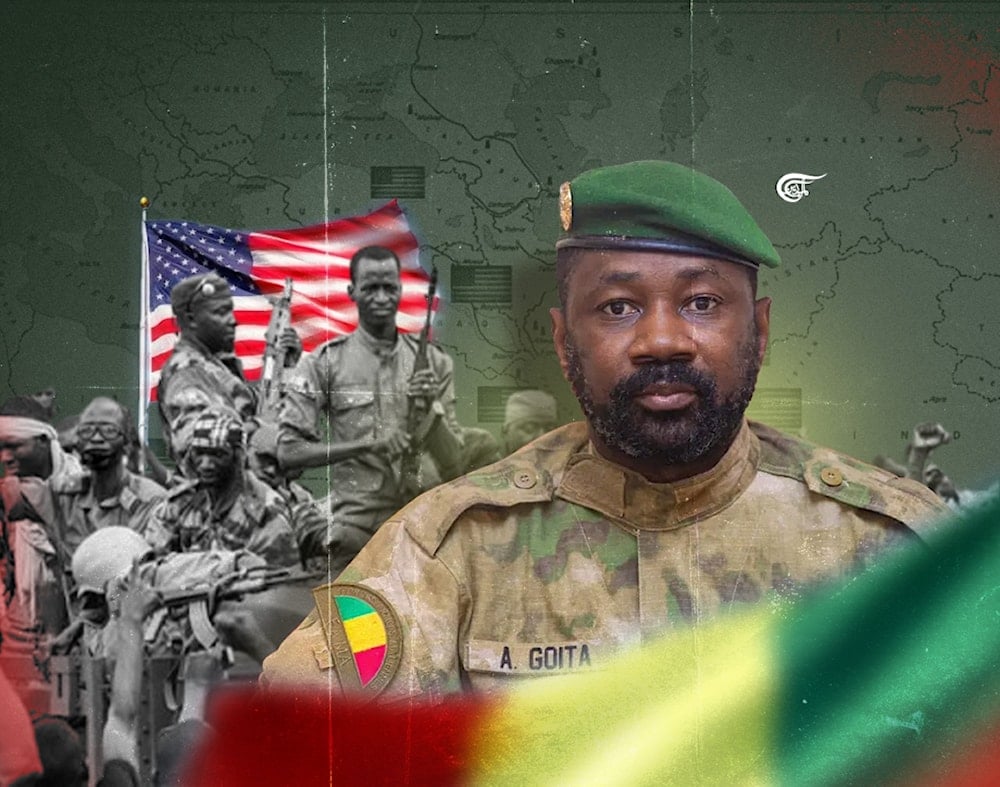US engagement with Mali junta exposes double standards
The Trump administration’s track record of backing Israeli belligerence is all proof that the US exercises the very brand of terrorism that it claims it wants to extinguish through cooperation with Mali.
-

Washington’s “counterterrorism” double standards in Mali exposed, backing juntas while preaching democracy (Illustrated by Zeinab al-Hajj; Al Mayadeen English)
The Trump administration, which has long projected its sense of foreign policy autonomy as a gift to the international order, appears to be taking a dangerous turn in West Africa. The latest show is Washington’s intensifying intelligence-sharing with Mali’s ruling junta leaders, to fight what the Trump administration sees as “extremist forces". But for a nation that has spent years instigating violence and undermining the region’s capacity to counter terrorism, engaging with Mali’s undemocratic leaders in the name of peace, it is reflective of Washington’s destructive foreign policy approach.
First, the Malian junta has been the focus of increased international isolation. US backing could afford greater space to the junta leaders to focus future targets on civilians, given the existing regime’s penchant to undermine civilian governance. The United States has spared no effort to undermine peace and stability in West Africa. Tall promises on standing by the region’s interests do not square off with Washington’s selective counterterrorism assistance to countries, outsized emphasis on questionable US national security interests, and engagement with several high-risk states in their slide towards autocracy and civil unrest.
For the Trump administration to open up intelligence-sharing with the junta, such an approach sends a powerful message that the United States – first and foremost – is focused on advancing its fight against “extremist” forces by partnering with regimes that have practiced it themselves. Mali is no outlier when it comes to human rights violations: the regime has advanced extreme legislation that has eclipsed civil liberties, and rights abuses saw a 120 percent increase in recent years. Where are loud US pronouncements about staying clear of regimes that do not fit the US definition of a democratic system? The fact is that the US itself has been a vocal promoter of terrorism on foreign soil: nearly two decades of Afghanistan’s occupation, the US role in sustaining the Taliban’s power, and its brazen support for "Israel’s" raging genocide – all make it a key figure in creating the unrest that it claims to counter through intelligence-sharing with Mali.
Add to it the Trump administration’s highly transactional approach to Africa, a region some may view at the bottom of the US agenda, and we understand that genuine peace that favors Mali’s people is a far cry from Washington. Engagement with the undemocratic leaders of Mali further reinforces this point: had it been any other country that went for controversial counterterrorism priorities with the junta, Washington would have reacted with fury. Glimpses of such risks were evident during the Myanmar junta’s takeover of the country, when the US chose to exercise sanctions and increase scrutiny of states with ties to the regime. The fact that the US faces little resistance in extending support to Mali’s leaders under the guise of effective counter terrorism is a tacit endorsement of the counter-terrorism double standards applied throughout its history.
Consider the Taliban. The United States, which now pretends to be one of the most vocal opponents of the existing Afghan regime, faced little hesitancy as it signed an agreement with the militant group, helped sustain it for years, and drove Afghanistan’s civilian population into the throes of death and destruction. Similar counterterrorism and intelligence claims were made back then as well, but evidence from the Congress’s own watchdog – SIGAR – makes clear that the country was left more vulnerable than witnessed in recent memory.
West Africa does not deserve a deep touch of US belligerence and undemocratic counterterrorism support. Extremism is a threat when it qualifies as a major challenge to the people, civil liberties, and the rights and protections of a country, determined by its own masses. By pushing US security concerns forward, largely in defiance of public interests, the United States is effectively positioning itself as a catalyst for continued repression, junta empowerment, and tacit support. The Trump administration’s track record of backing Israeli belligerence, taking its genocidal ambitions from strength to strength, and aiding the massacres of thousands of civilians, is all proof that the US exercises the very brand of terrorism that it claims it wants to extinguish through cooperation with Mali.
Thus, prospects for intelligence-driven terror gains appear bleak. Washington is advancing its proximity to the junta at a time when Africa is increasingly on the quest to secure its autonomy and agency in the face of Western colonial holdovers. Look no further than simmering reservations about French colonial rule: it wreaked havoc in states and adds to the view that the colonial entities still deny modern-day apologies and effective reparations for the destruction West Africa continues to endure. The United States, through its loud pronouncements on upholding human rights, is a scar on the face of genuine justice, given its continued role in illegally deporting Africans from its shores and cultivating a climate of extremism in the region. Part of those efforts has been reflected in patchwork counterterrorism approaches, which have empowered many groups or left promised peace gains on ice.
Therefore, cozying up to Mali’s junta leaders in the name of promoting peace is another invitation for US belligerence in a country that has seen plenty.

 Hannan Hussain
Hannan Hussain
 5 Min Read
5 Min Read











